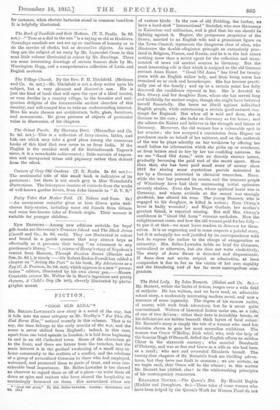FICTION.
"GOOD OLD ANNA." * Mn. BELLOO-LOWNDES'S new story is a novel of the war, but it falls into the same category as Mr. Bradby's "For This She Had Borne Him," noticed recently in this column. That is to say, the time belongs to the early months of tho war, and the scene is never shifted from England ; indeed, in this case, apart from one brief episode in London, it is laid from beginning to end in an old Cathedral town. Some of the characters go to the front, and there are letters from the trenches, but the main interest is in the gradual awakening of a small stay-at- home community to the realities of a conflict, and the relations of a group of naturalized Germans to those who had employed, welcomed, and promoted them to posts of trust, and even con- siderable local importance. Mr. Belloo-Lowndes is too shrewd an observer to regard them as all of a piece—to write them all down as spies and traitors who have abused the hospitality so unstintingly bestowed on them. Her naturalized aliens aro • " Good Old Anna." 13y 31n. Delloo-Lowadee. Landau : Hutchison end OR Ma of various kinds. In the case of old Profiling, the barber, we have a hard-shell " International" Socialist, who sees the 'enemy in Kaiserism and militarism, and is glad that his son should be fighting against it. Hegner, the prosperous proprietor of the Stores, married to an English wife and a prominent figure on the Town Council, represents the dangerous class of alien, who illustrates the double-allegiance principle so extensively prac- tised in Belgium, France, and Russia, and he is in tho last resort nothing more than a secret agent for the collection and trans- mission of news vid neutral sources to Germany. But the most interesting role is that which is assigned to the old German servant Anna Bauer. "Good Old Anna " has lived for twenty years with an English widow lady, and from being nurse has remained on as cook and housekeeper. She has become practi- cally one of the family ; and up to a certain point has fully deserved the confidence reposed in her. She is devoted to Mrs. Otway and her daughter Rose, whom she has served long and faithfully for modest wages, though she might have bettered herself financially. She boars no illwill against individual English people, while entertaining a certain good-natured con- tempt for England. But when all is said and done, she is German to the core ; she looks on Germany as her home ; and she adores the Kaiser and believes in the strength and future of Germany. Moreover, the old woman has a vulnerable spot in her avarice ; she has accepted a commission from Hegner on purchases made on behalf of her mistress, and on the outbreak of the war he plays adroitly on her weakness by offering her small bribes for information which she picks up or overhears, or from letters read to her by her too confiding mistress. So we see " Good Old Anna," with no directly sinister intent, gradually becoming the paid tool of the secret agent. More than that, she has been paid small sums of money since 1912 for storing some mysterious parcels entrusted to her by a German interested in chemical researches. Mean- while the war has pursued its course, and the innocent people of Witanbury have had their unreasoning initial optimism severely shaken. Even the Dean, whose spiritual home was in Germany, and whose attitude at the outset was strongly pacifioist, has altered his tone. The young Baronet, who is engaged to his daughter, is killed in action ; Rose Otway's lover is badly wounded ; and Major Guthrie, her mother's greatest friend, is reported missing. But still Mrs. Otway's confidence in " Good Old Anna " remains unshaken. How the enlightenment came, and how the old woman paid for her folly— to put it at that—we must leave readers to discover for them- selves. It is an engrossing and in some respects a painful story, but it is unhappily too well justified by its correspondence with fact to expose the author to the charge of exaggeration or animosity. Mrs. Belloo-Lowndes holds no brief for Germans, naturalized or otherwise, but she does not write vindictively. The study of Anna Bauer is detached and dispassionate. If Anna does not excite respect or admiration, at least compassion is due to her as the victim of her own cupidity and the blundering tool of her far more unscrupulous com- patriots.










































 Previous page
Previous page